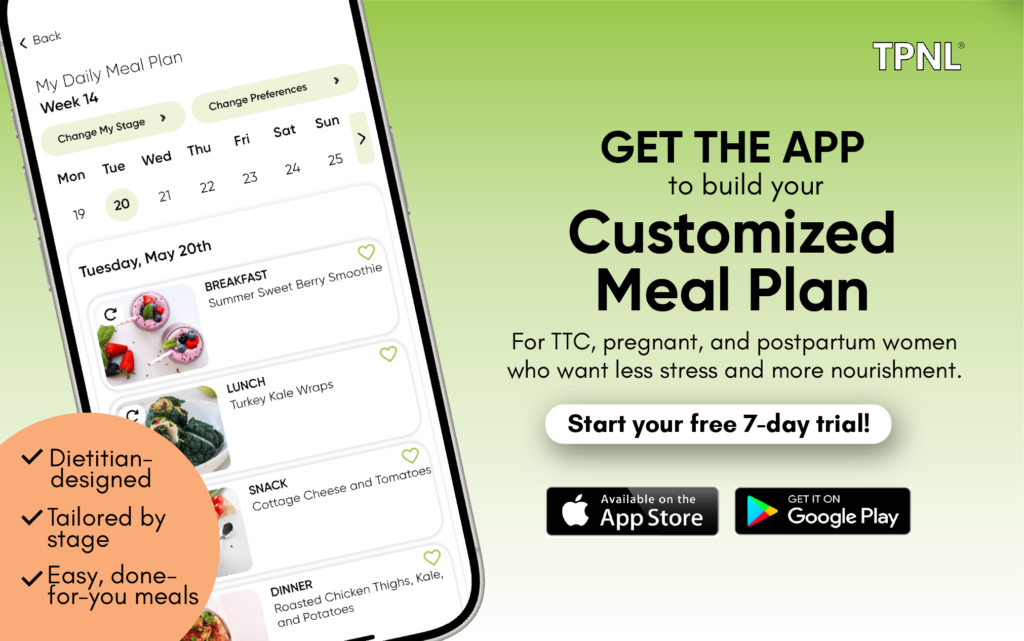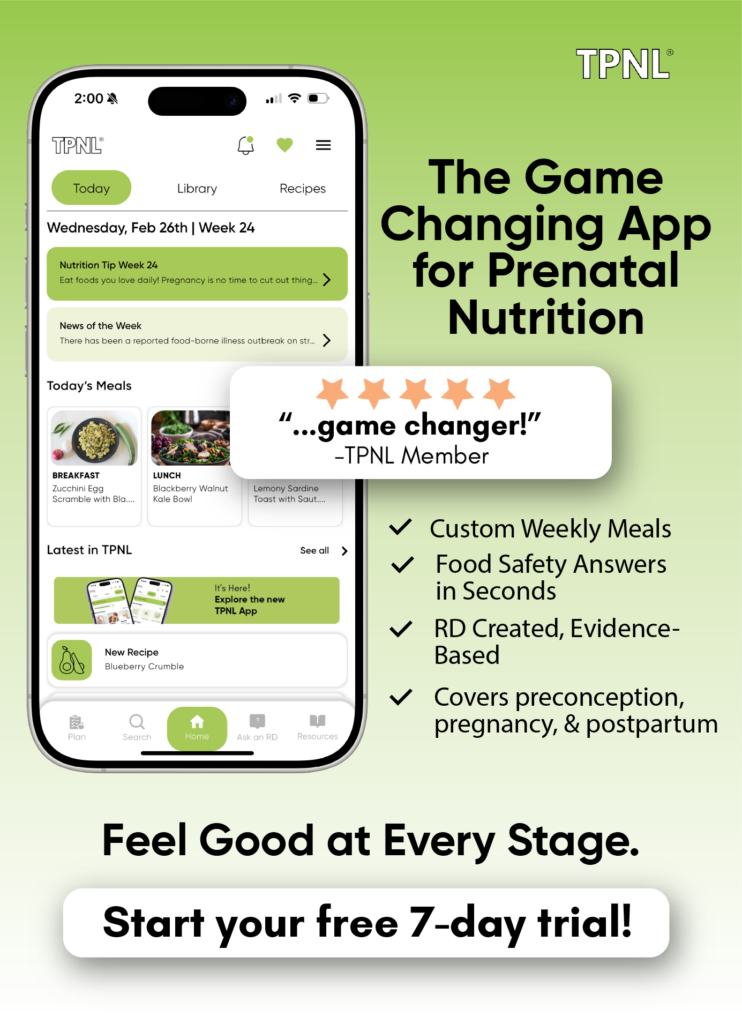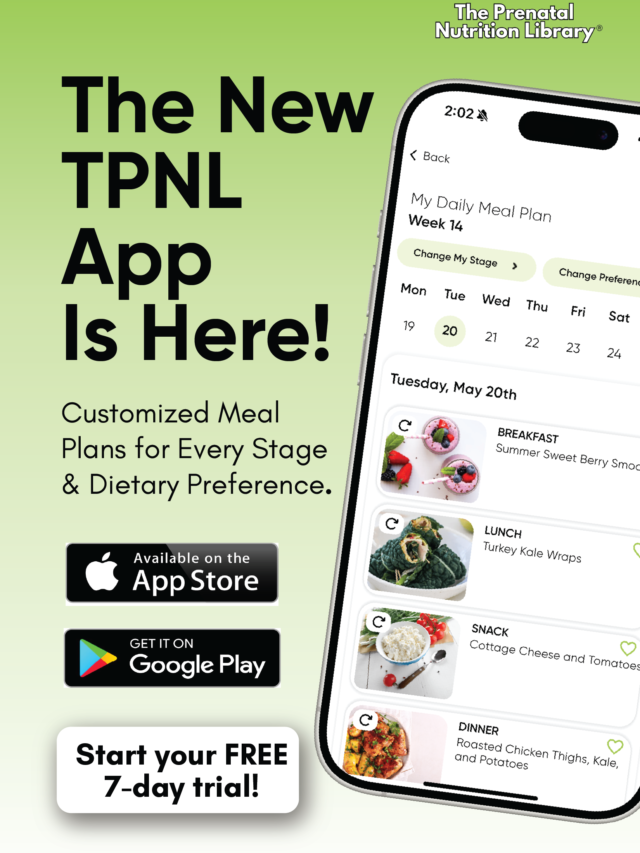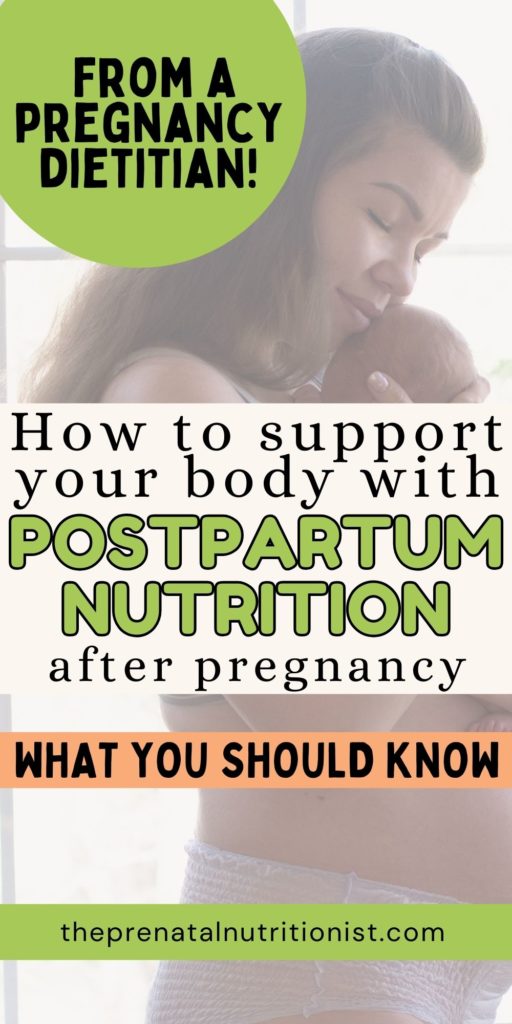
The postpartum period is one of the most unique and transformative phases of a woman’s journey, but it’s also one of the most overlooked. After months of focusing on growing your baby, your own health can easily slip into the background. Between sleepless nights, feeding schedules, learning how to breastfeed, and a rollercoaster of emotions, deciding what to eat can feel overwhelming. Sometimes, it may feel impossible.
Yet nutrition during this stage is vital. The right foods support healing, restore energy, and even influence milk supply. Your body is still working hard, and what you eat is doing powerful work behind the scenes. Prioritizing nutrient-dense, supportive foods remains more important than ever.
I also know just how challenging this time can be. That’s why I’ve created a simple postpartum diet outline you can use as a guide. This isn’t about fad diets or strict rules. It’s about practical nourishment that supports your recovery, healing, and overall health. With the right support, you can feel cared for as you care for your baby.
Postpartum Diet Plan: What You Need To Know
In this post, you’ll find a clear, evidence-based introductory guide to postpartum nutrition. This way, you can eliminate all the guesswork from your postpartum diet and focus more on recovering and enjoying time with your new little one. You’ll learn:
- Which foods should you include in your diet to support recovery, energy, and milk supply
- Why nutrition is so important in the postpartum period
- Tips for snacks, meal prep, and creating balanced meals
- Different approaches to meals depending on your goals and dietary restrictions, including breastfeeding support and weight loss
By the end of this blog post, you’ll better understand how to nourish your body, meet your nutritional needs, and support your recovery while caring for your new addition. Eating a well-balanced postpartum supportive diet shouldn’t be confusing or stressful—you deserve to feel confident and empowered.
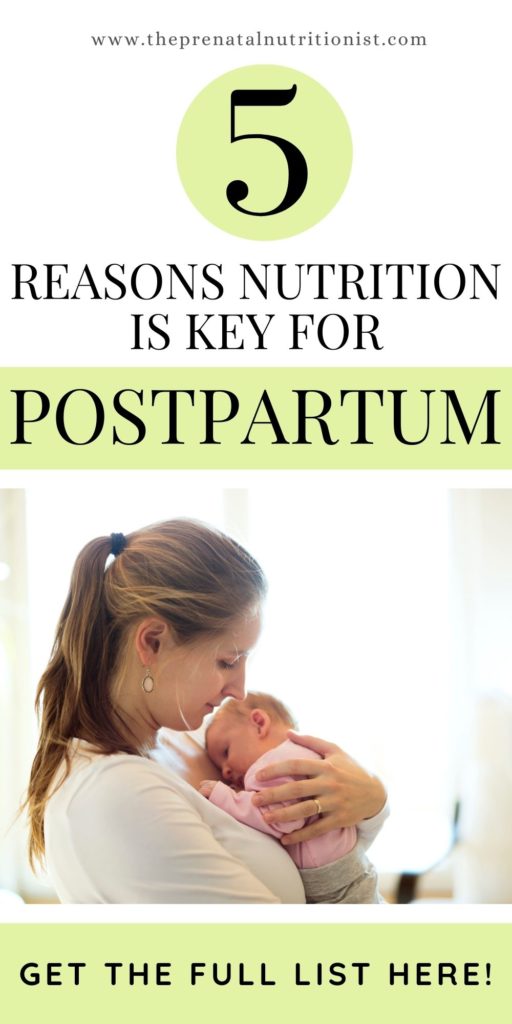
What Is The Importance Of Nutrition During the Postpartum Period?
First, let’s go over why nutrition is so essential during the postpartum period:
Supports Recovery
Pregnancy and childbirth bring incredible changes, and the right nutrition helps your body rebuild. Protein-rich foods, leafy greens, healthy fats, and fiber-filled carbohydrates provide the vitamins and minerals essential for healing. Nutrients such as fiber, iron, and omega-3 fatty acids act as building blocks for tissue repair, hormone balance, and overall well-being. These nutrients help you feel stronger and more resilient as you recover.
Helps Keep You Energized
Caring for a newborn is exhausting. Even simple daily tasks can feel overwhelming when your energy is running low. Nourishing, balanced meals are key to keeping your stamina up. Adding a few extra calories from nutrient-dense sources helps support the increased demands of this season. Whole grains, proteins, nuts, seeds, beans, lentils, and various fruits and vegetables work together to provide steady fuel, helping you avoid the dreaded afternoon slump and stay energized for what the day brings.
Supports Milk Supply
Milk supply is primarily driven by demand. This means how often and effectively your baby nurses or you pump. That said, your nutrition still plays an important role in supporting your body’s ability to meet these demands. Eating a variety of foods rich in iron, calcium, protein, and healthy fats helps maintain your health, energy, and nutrient stores while you’re breastfeeding. Adequate calories and hydration are vital in the early weeks of breastfeeding. While nutrition doesn’t directly control milk supply, it does help you feel your best and support the breastfeeding journey.
Promotes Mental Wellbeing
Nutrition plays a role in postpartum mental health. More specifically, omega-3 fatty acids, magnesium, and B vitamins support mood and brain function. Including seeds, nuts, leafy greens, and whole grains in your diet can help support your mood and may reduce feelings of anxiety or fatigue.
Supports Weight Loss When Appropriate
Let’s be clear, the large societal pressure to return to pre-pregnancy weight very quickly after birth does not support mom’s healing or mental well-being. The priority is to celebrate all your body has done over the last year, and allow plenty of time to heal, recover, and bond with your little one. We generally recommend waiting at least three months postpartum before focusing on any intentional weight loss efforts (if that’s your personal goal). Additionally, if you’re nursing, wait until breastfeeding is well-established to avoid dips in milk supply.
If weight loss is your goal, incorporating healthful habits, including proper nutrition, can support you in reaching your goals. Every journey is unique, and proper nutrition can help you achieve your goals without compromising on necessary nutrients.
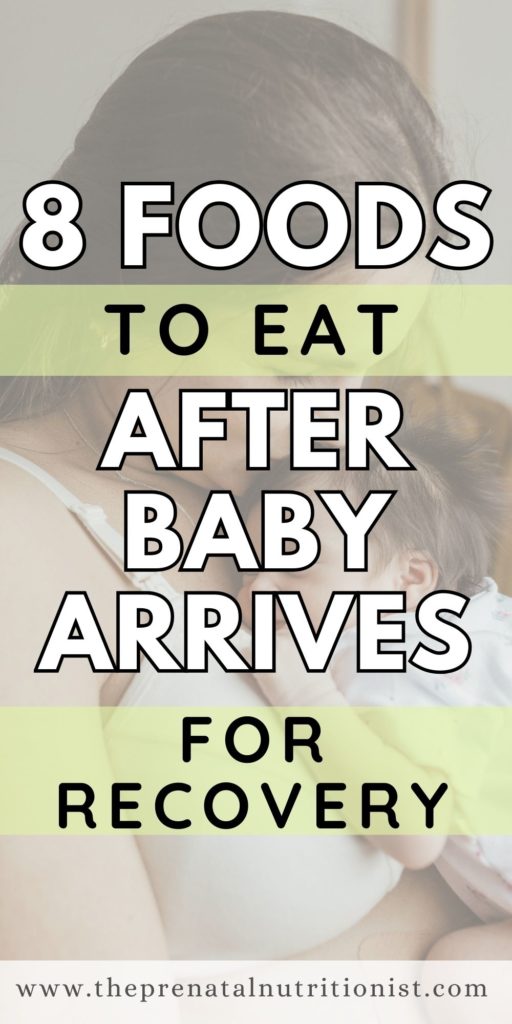
What To Eat Postpartum
In the weeks and months after giving birth, your body needs nourishing foods that promote healing, restore energy, and support this journey if you’re breastfeeding. This isn’t about following a strict “diet.” Instead, think of it as fueling your body with the nutrients it deserves while you care for yourself and your little one.
Sweet Potatoes
Sweet potatoes are a powerhouse food for postpartum recovery. They provide complex carbohydrates for steady energy, beta-carotene (which plays a role in tissue repair and immune support), and plenty of fiber to aid digestion. Naturally sweet and versatile, they make an easy addition to meals or snacks, whether roasted, mashed, or tucked into a hearty bowl.
Leafy Greens
Spinach, kale, and Swiss chard are rich in vitamins and minerals, including magnesium and folate. These nutrients support gut health, energy production, and overall well-being. The best part? You can add them to smoothies, salads, or even saute them as a side dish. I like how adaptable leafy greens are.
I posted these fruit smoothie recipes for pregnancy, but honestly, they’d be just as great during postpartum!
Brown Rice (And Other Whole Grains)
Whole grains such as brown rice, quinoa, and oatmeal are excellent staples for the postpartum period. They’re rich in B vitamins, magnesium, manganese, selenium, and antioxidants, all of which help support energy production and aid recovery. Plus, they pair beautifully with vegetables and proteins, making it easy to build balanced, nourishing meals that are simple to prepare and promote healthy digestion.
Protein, Especially Meat
Protein is essential at every stage from preconception to pregnancy and postpartum. After birth, it provides the building blocks your body needs to repair tissues, support healing, and maintain strength. Sources such as chicken, turkey, beef, and fish provide high-quality protein and valuable micronutrients, including iron, zinc, and B vitamins, that aid in recovery and energy production. Eggs are another excellent option. They are quick to prepare and versatile. Making protein a priority at each meal helps keep you nourished and supports your postpartum healing.
Quality Fats
Healthy fats play a key role in postpartum recovery. They are essential for hormone health and production. Sources such as olive oil, avocado, nuts, seeds, and fatty fish provide omega-3 fatty acids, which are especially important for supporting mood, brain health, and overall well-being. Fats also make it easier for your body to absorb fat-soluble vitamins (A, D, E, and K).
Dairy (and Alternatives)
Calcium needs don’t increase during pregnancy, but your body does absorb it more efficiently. After birth, it’s still important to replenish your own stores, especially if you’re breastfeeding, since calcium is transferred into breast milk. Dairy foods, such as yogurt, milk, and cheese, are excellent sources of calcium. If you do not eat dairy, include alternate calcium sources like leafy greens and salmon. These nutrients help support bone health, tissue repair, and recovery, as well as your baby’s development if you are breastfeeding.
Fruits and Vegetables
Fresh fruits and vegetables contain vitamins, minerals, fiber, and antioxidants that support postpartum healing and overall health. Antioxidants help support the immune system, while fiber promotes healthy digestion, something especially important during recovery. Colorful produce, such as berries, citrus fruits, bell peppers, and leafy greens, is rich in vitamin C, essential for wound healing and tissue repair. This is important whether you’ve had a vaginal delivery or a C-section. Aim for various colors on your plate to cover various nutrients.
Hydration
I posted “How Much Water Should You Drink A Day During Pregnancy?” and am often asked if the same guidelines apply postpartum. And the answer is… Absolutely! Staying hydrated is crucial for postpartum mothers, supporting milk production, digestion, and overall energy levels. Caffeine-free herbal teas and water-rich fruits like watermelon can also contribute to your daily fluid intake.
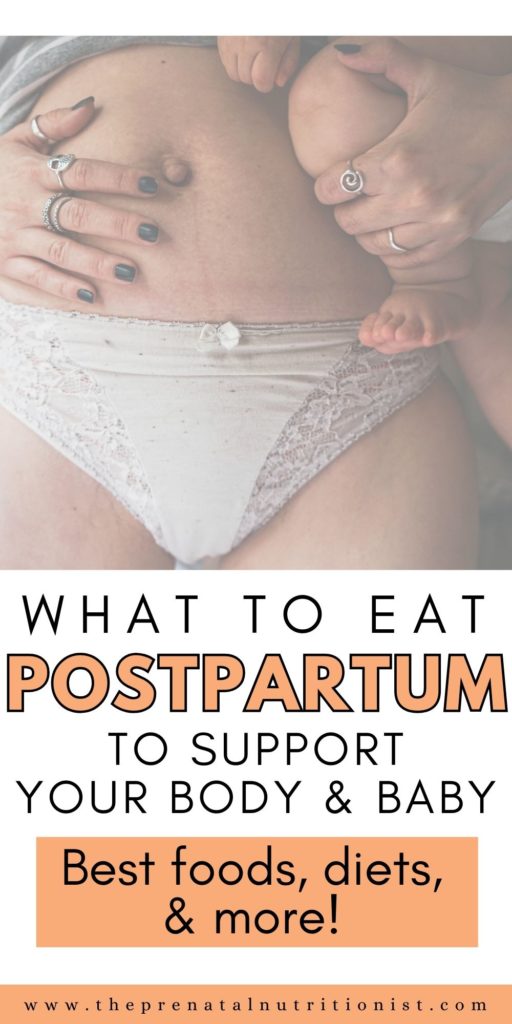
What Is The Best Postpartum Diet Plan?
There’s no one-size-fits-all approach to eating after birth. The best postpartum diet meets your unique needs, supports recovery, and fits seamlessly into your lifestyle.
Below, you’ll find a breakdown of EXAMPLES of evidence-based diet approaches that may work well during this stage. Each is designed to be flexible, practical, and a starting point for building your individualized postpartum diet.
Postpartum Breastfeeding Diet Plan:
If you’re breastfeeding, this phase of your journey is about nourishing yourself and your baby. A breastfeeding-friendly diet emphasizes foods that provide sustained energy, support recovery, and help you feel your best while meeting your increased nutrient needs.
- Focus: Support breastfeeding and overall health
- Calories: Increase slightly to meet the demands of milk production and recovery
- Key foods: Leafy greens, fiber-rich carbs, fruits, vegetables, meats, eggs, seafood, and healthy fats
- Tips: Include meals and snacks every 2-3 hours to maintain energy and support breastfeeding nutrient demands
- Bonus: Keep prenatal vitamins on hand to ensure you meet all of your micronutrient needs
Postpartum Weight Loss Diet Plan:
If you’re thinking about weight loss after having a baby, know there’s absolutely no rush. Your body has just done something incredible and deserves time, nourishment, and kindness. Instead of focusing solely on the need to “lose weight,” this plan outline is about supporting your recovery, helping you feel strong, and finding balance at your own pace. Please remember that we encourage waiting at least 3 months before attempting intentional weight loss as a goal.
It can look something like this:
- Focus: Gradual weight loss/weight management while supporting recovery and energy
- Calories: Moderate reduction, should be adjusted individually
- Key foods: Nutrient-dense vegetables, complex carbs (high in fiber), protein, quality fats
- Tips: Prioritize easy meal prep and balanced meals to promote balanced blood sugar and satiety
- Notes: Weight loss should be gradual to continue to maintain breastfeeding and overall well–being
Postpartum Vegetarian Diet Plan:
We encourage including animal-based foods in your postpartum diet if possible. While animal-based foods provide many of the nutrients most valuable in the postpartum period, we know some individuals choose a plant-based lifestyle for personal, ethical, or health reasons. With careful planning, it’s possible to meet your nutrient needs postpartum while following a vegetarian diet.
We do not recommend a fully vegan diet, void of all animal products, while pregnant or postpartum, as your needs are way too high in many nutrients that are primarily found and better absorbed from animal foods.
- Focus: Prioritize plant-based nutrients that support recovery, energy, and (if breastfeeding) lactation.
- Calories: Slight increase to cover the demands of healing and, if applicable, milk production
- Key foods: Eggs, dairy, legumes, lentils, tempeh, whole grains, leafy greens, nuts, seeds, fruits, and vegetables (adding seafood or marine collagen, when possible, can provide extra nutritional support)
- Tips: Take a comprehensive prenatal or postnatal multivitamin to cover nutrients that are harder to obtain through plants alone (such as vitamin B12, iron, iodine, calcium, and DHA)
- Strategy: Include a protein-rich food at every meal and aim for a wide variety of colorful vegetables to maximize nutrient density
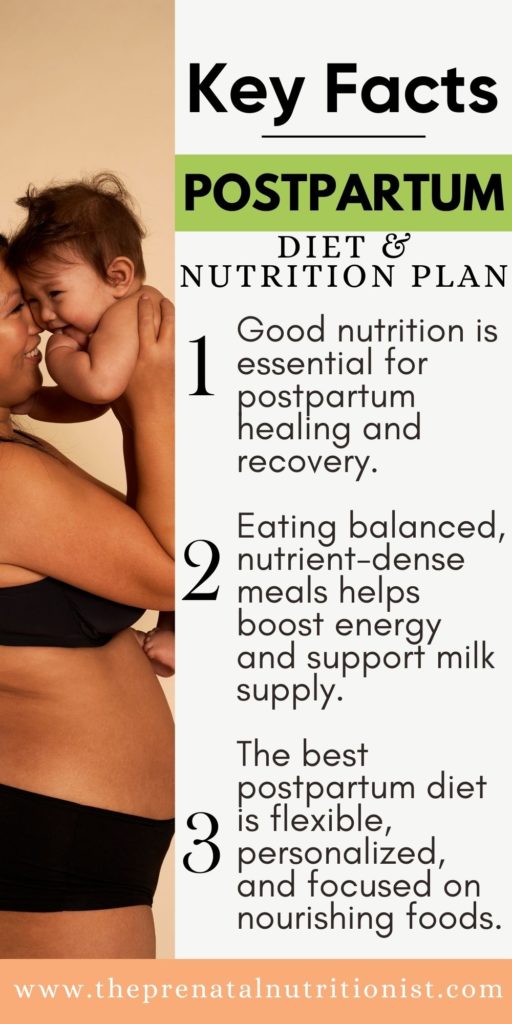
Focus on including nutrient-dense foods during the postpartum period!
The postpartum period is incredibly demanding, and it’s easy for your own nutrition to slip down the priority list. But what you eat now directly supports your energy, healing, milk production, and overall well-being. By focusing on balanced, nutrient-dense meals, you take the guesswork out of fueling your body. Plus, having a clear idea of what to eat simplifies meal and snack planning, so you can nourish yourself while caring for your little one. Check out these Postpartum Meal Ideas, too!
Our goal is to remove the overwhelm and give you clear, straightforward guidance so you can feel confident nourishing yourself through TTC, pregnancy, and postpartum. Inside The Prenatal Nutrition Library app, you’ll find custom meal plans, hundreds of easy recipes, and stage-by-stage guidance, all available with your free trial.
Remember: this isn’t about perfection. Some days, grabbing a quick snack between diaper changes and feedings is the best we can do. The overall goal is to have a plan that helps you feel supported, balanced, and nourished as you care for yourself and your baby. You’ve got this!

